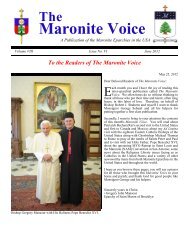March 2013 - Eparchy of Saint Maron of Brooklyn
March 2013 - Eparchy of Saint Maron of Brooklyn
March 2013 - Eparchy of Saint Maron of Brooklyn
Create successful ePaper yourself
Turn your PDF publications into a flip-book with our unique Google optimized e-Paper software.
AD, wanted to bring a uniformity <strong>of</strong><br />
practice throughout the Church.<br />
Letters were exchanged and heated<br />
meetings were held, but eventually<br />
the Pope relented since the custom<br />
was an ancient one. The practice <strong>of</strong><br />
celebrating Easter on a day other<br />
than Sunday eventually died out by<br />
the fourth century, but controversies<br />
about the date <strong>of</strong> the celebration did<br />
not end.<br />
Council <strong>of</strong> Nicea<br />
Throughout history bishops have<br />
assembled with their experts to<br />
discuss significant issues; such<br />
assemblies are called ecumenical<br />
councils. The Catholic Church has<br />
conducted twenty-one ecumenical<br />
councils, the most recent one being<br />
Vatican II (1962 - 65). In 325 AD,<br />
an ecumenical council was<br />
conducted in Nicea (Iznik, in<br />
present-day Turkey). One <strong>of</strong> the<br />
questions facing the assembly was<br />
the date <strong>of</strong> Easter.<br />
By that time, all Christians were<br />
celebrating Easter on the same day -<br />
Sunday - but there was diversity in the<br />
dates. The Syriac Christians subject to<br />
Antioch celebrated Easter on the<br />
Sunday after the Jews celebrated<br />
Passover. The rest <strong>of</strong> the Christians in<br />
the Roman Empire observed the<br />
practice <strong>of</strong> Alexandria and calculated<br />
the date <strong>of</strong> Easter for themselves. Such<br />
a divergence <strong>of</strong> methods <strong>of</strong> calculations<br />
meant that the date <strong>of</strong> Easter in Antioch<br />
and Alexandria did not always<br />
coincide. A meeting <strong>of</strong> bishops in<br />
Arles, France, in 314, called for a<br />
uniform date and recommended that the<br />
Bishop <strong>of</strong> Rome send out a letter every<br />
year announcing the date <strong>of</strong> Easter.<br />
The bishops at the Council <strong>of</strong> Nicea<br />
decided to calculate Easter without<br />
regard for the Jewish calendar and its<br />
computation <strong>of</strong> Passover. The basic<br />
principle formulated at Nicea is that<br />
Easter is to be celebrated on the Sunday<br />
following the full moon after the spring<br />
equinox. The determination <strong>of</strong> the full<br />
moon and the vernal equinox was not<br />
made through astronomical calculation,<br />
but rather, the spring equinox was fixed<br />
to fall on <strong>March</strong> 21, while a full moon<br />
was fixed at the fourteenth day <strong>of</strong> the<br />
lunar month.<br />
Julian And Gregorian<br />
Calendars<br />
In 46 BC, Emperor Julius Caesar<br />
reformed the Roman calendar, and his<br />
system, the Julian Calendar, was used<br />
for the next 1600 years. (As a reward,<br />
a month, July, was soon named after<br />
him; his successor Augustus was<br />
honored with having the next month<br />
named after him in 8 BC.) There was a<br />
problem with the Julian calendar: it<br />
calculated the year to be 365.25 days,<br />
eleven minutes short <strong>of</strong> the actual orbit<br />
<strong>of</strong> the earth around the sun. This<br />
difference resulted in a drift <strong>of</strong> three<br />
days for every 400 years. In 1582,<br />
Pope Gregory XIII introduced a new<br />
calendar to correct the ten day drift -<br />
the spring equinox was then occurring<br />
on <strong>March</strong> 11, instead <strong>of</strong> <strong>March</strong> 21, as<br />
fixed at the Council <strong>of</strong> Nicea. The new<br />
calendar (named after the pope, hence<br />
Gregorian Calendar) skipped ten days,<br />
which meant that the year 1582 would<br />
proceed normally until October 4; the<br />
next day was October 15. This<br />
anomaly meant that <strong>Saint</strong> Teresa <strong>of</strong><br />
Avila died on the night <strong>of</strong> October 4 -<br />
15, 1582.<br />
The Gregorian calendar was adopted<br />
by most Catholic countries at some<br />
point in 1582, but other non-Catholic<br />
countries and churches were resistant<br />
to the change. For example, the<br />
British Empire (which at the time<br />
included the east coast <strong>of</strong> North<br />
America) wanted nothing to do with<br />
this Catholic contrivance and adopted<br />
the calendar only in 1752 (by that<br />
time, there was a need to skip eleven<br />
days). Most <strong>of</strong> the Orthodox<br />
Churches continue to resist the<br />
adoption <strong>of</strong> this Catholic calendar and<br />
still follow the Julian calendar, and<br />
this is the reason that the Orthodox<br />
church across the street observes<br />
Easter on another date.<br />
A Common Date For<br />
the Celebration <strong>of</strong><br />
Easter<br />
A difference in the dates <strong>of</strong> Easter is<br />
not the gravest problem facing the<br />
Church <strong>of</strong> Christ today. In fact, there<br />
might be something positive to it: it<br />
allows us to celebrate the great event<br />
twice each year! However, it is<br />
problematic that we are unable to agree<br />
on it.<br />
There has been much discussion on<br />
establishment <strong>of</strong> a common date: One<br />
proposal for resolution is to establish a<br />
fixed date each year. This is<br />
problematic because it ignores a<br />
tradition established in the second<br />
century that Easter would always be<br />
celebrated on a Sunday. Another<br />
proposal is that Easter be celebrated on<br />
a Sunday within a range <strong>of</strong> seven dates;<br />
the second Sunday <strong>of</strong> April has been<br />
discussed.<br />
The Orthodox Church attempted to<br />
revise its calendar in 1923; the proposal<br />
was never implemented, but schisms<br />
(divisions) within the Orthodox Church<br />
arose. In the context <strong>of</strong> preparations for<br />
the Great and Holy Council <strong>of</strong> the<br />
Orthodox Church, the Orthodox Church<br />
has examined the issue since 1961, but<br />
no plan has been implemented. The<br />
World Council <strong>of</strong> Churches proposed a<br />
method <strong>of</strong> computing the date <strong>of</strong> Easter<br />
at a summit in Aleppo, Syria, in 1997;<br />
again, it was never to be implemented.<br />
(Continues on page 17)<br />
The <strong>Maron</strong>ite Voice Volume IX Issue No. III Page 14 <strong>March</strong> <strong>2013</strong>

















